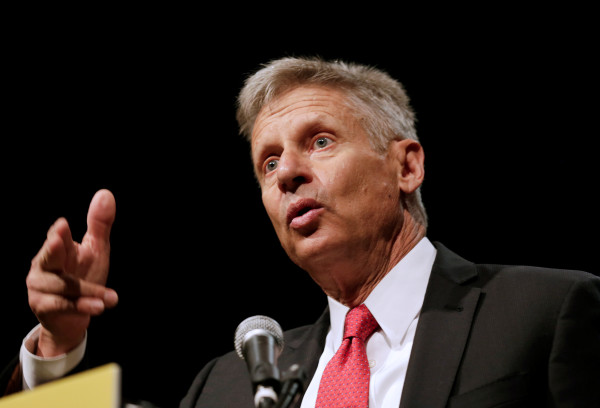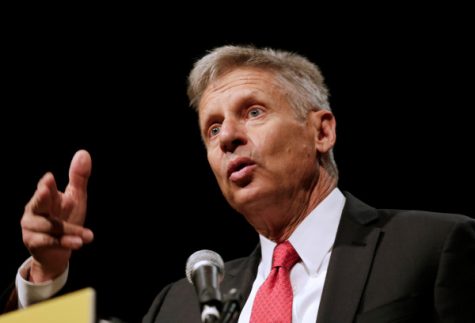The Rise and Fall of Gary Johnson

Courtesy of Kevin Kolczynski. Libertarian Party presidential candidate Gary Johnson delivering a speech.

The 2016 presidential election confronts what is largely considered to be the most negative political atmosphere in recent history. While Donald Trump, the Republican nominee, has made arguably inappropriate statements that shocked the world and attached controversy to his name, Hillary Clinton, the Democratic nominee, has similarly been associated with suspicious scandals concerning the leaking of classified government information through email. Faced with the seemingly impossible choice of choosing the lesser of two evils, American citizens are reluctant to decide who to vote for. When asked about his views of the presidential election, Wilcox teacher Mr. Soykin stated, “While I have plenty of my own doubts and worries about a Hillary Clinton presidency, those worries pale in comparison to the dread I feel about a Trump presidency.” In the midst of all this chaos and controversy, Gary Johnson, the Libertarian candidate, emerges from the smaller parties and attempts to take his opportunity to become the alternate choice to Trump and Clinton.
Johnson received a generous and growing amount of support in the months leading up the presidential debate, as the Washington Post reported that he accumulated up to 8 percent of the national votes, which was steadily rising. Johnson’s main supporters are found to be mainly under the age of fifty and evenly spread out between men (49 percent) and women (51 percent). Statistics also reveal that Johnson’s supporters are mainly political independents – people who vote for politicians based on their individual speeches and ideologies without any regard to “party loyalty” – that were unsatisfied with the presentations of both Trump and Clinton so far.
However, Johnson’s hope to participate in the televised and influential presidential debate on September 26th was abruptly crushed, as he misspoke during an interview on MSNBC when he was asked a question regarding the situation of the violent refugee crisis in Aleppo, Syria. “What would you do if you were elected, about Aleppo?” asked show host Mike Barnicle. After a pause, Johnson embarrassingly replied “What is Aleppo?” This “Aleppo Incident” was a crucial mistake made by Johnson that led to many people criticizing him for his lack of knowledge in foreign policies and ultimately stunted the growth of his supporter base into a plateau at 10 percent. This mistake proved to be devastating for Johnson and his chance to join the presidential debate, as the Commission on Presidential Debates announced on September 16th that only Donald Trump and Hilary Clinton were officially invited to the first presidential debate. Despite experiencing utter disappointment and improbable chances, Johnson announced later on CNN that he would “not back down” and attempts to join the second presidential debate on October 9th.
Even though Johnson’s chances of becoming president are considered almost impossible by political experts, the question must be asked: despite his weaknesses in foreign policy, how well would Johnson satisfy the presidential role, and how would he affect America? As mentioned before, many Americans long for an alternate option to the two main presidential candidates, as both Trump and Clinton have been widely considered as people who would be detrimental to the already troubled condition of the United States. However, not all Americans are aware of Johnson and his policies, which could be a major factor contributing to Johnson’s low level of support besides his “Aleppo Incident.” A report by the New York Times reveals that some Americans even admitted that they did not know about Johnson until after his mistake with MSNBC.
Some of Johnson’s policies include: opposition against the deportation of undocumented immigrants, legalizing abortion, replacement of progressive income tax with consumption tax, and opposition against any proposal from Congress that required the government to borrow money. Johnson also strongly opposes the death penalty, as he states in his book The Seven Principles of Good Government, “killing one innocent person who was wrongly accused is not worth executing ninety-nine guilty people”. When asked about his opinion of Johnson’s beliefs, Mr. Soykin strongly identified with an article by The Onion – a news satire organization – that described Johnson’s policies as “Things you adamantly agree with mixed with horrifying things you would never consider.” Johnson’s knowledge and position in domestic policies is considered to be well-rounded and reasonable, however the way he would have affected America as the president of the United States can only be hypothesized, as his once promising potential chances to join the presidential debate sharply decline, ultimately dwindling down his opportunity to become president in 2016.





